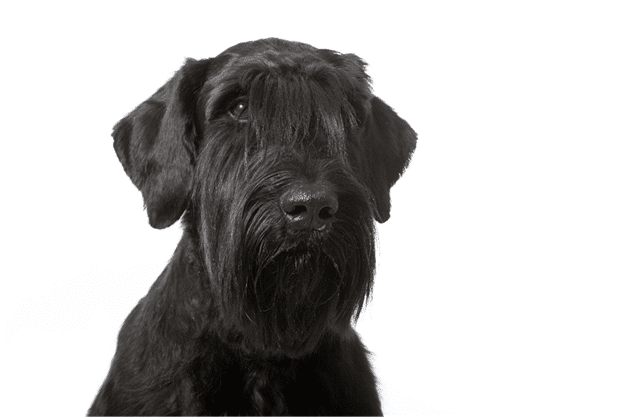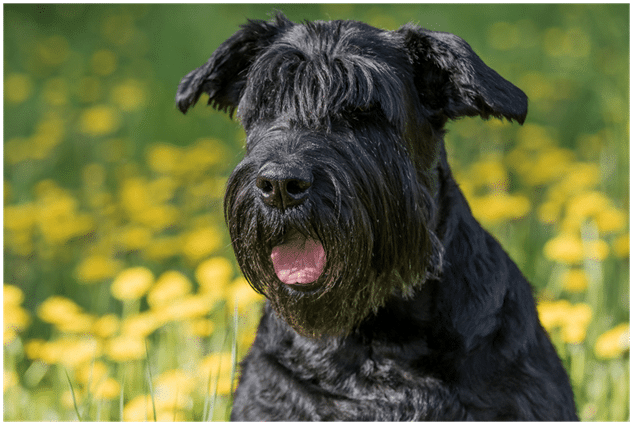If you’ve ever wondered whether Giant Schnauzers drool, you’re not alone. This is a common question among dog owners, especially those considering adding a giant schnauzer to their families.
While all dogs produce saliva, some breeds are notorious for drooling more than others. So, do giant schnauzers fall into that category? Read on to find out.
Giant Schnauzers drool for a number of reasons. These can be due to their overactive salivary gland, teething, being thirsty, feeling overheated, being sick, feeling excited, being nervous, playing, or simply eating something tasty.
We examine these further, including looking at several health concerns to be aware of, along with some practical tips to consider in reducing this behavior in your Giant Schnauzer.
Why is my Giant Schnauzer Drooling So Much?
Giant Schnauzers are one of the more popular giant breeds that can drool for many reasons. We have outlined nine of the most common triggers as follows:
1. They may have an overactive salivary gland.
2. They may be teething.
3. They may be thirsty.
4. They may be overheated.
5. They may be sick.
6. They may be excited.
7. They may be nervous.
8. They may be playing.
9. They may be eating something tasty!
Overactive Salivary Gland
One possible reason your Giant Schnauzer is drooling is that they have an overactive salivary gland. This means their saliva glands are working overtime, and as a result, they are producing more saliva than normal.
Teething
Another common reason dogs drool is because they are teething. As puppies start to lose their baby teeth and grow their adult teeth, they may drool more than usual. This is completely normal and nothing to worry about.
Thirsty
If your Giant Schnauzer is drooling more than usual, it could be a sign that they are thirsty. Make sure you are giving them plenty of fresh water to drink throughout the day.
Overheated
Another reason your Giant Schnauzer may be drooling is that they are overheated. If it is hot outside or if they have been exercising vigorously, they may start to drool as a way to cool down their body temperature.
Sickness
If your Giant Schnauzer is drooling and seems to be acting differently than usual, it could be a sign that they are sick. If they are also showing other signs of illness such as vomiting, diarrhea, or lethargy, you should take them to the vet right away.
Excitement
It’s not just humans who get excited and start to drool! Dogs can also drool when they are excited about something. If your Giant Schnauzer is drooling and wagging their tail eagerly, it’s likely they are just excited about something.
Nervousness
Dogs can also start to drool when they are feeling nervous or anxious. If your Giant Schnauzer is in a new or scary situation, they may start to drool as a way to cope with the stress.
Playing
Dogs sometimes drool when they are playing too! If your Giant Schnauzer is playing with a toy or chewing on a bone, it may start to drool as a result.
Eating something tasty
And finally, sometimes dogs drool simply because they are eating something really tasty! If your Giant Schnauzer is gobbling down their food, it’s likely that they are tasting something really good and are letting everyone know about it!
When Should I Worry about my Dog Drooling?

If your dog is drooling excessively or if the drool is accompanied by other signs of illness, such as vomiting or diarrhea, you should take him to the veterinarian for an evaluation.
However, some dogs simply drool more than others, and there is usually no cause for concern unless the drooling is causing problems like dehydration or pneumonia. If you’re not sure whether your dog’s drooling is normal, ask your veterinarian.
Which Virus Causes Drool Reflux in Dogs?
There are a few viruses that can cause drool reflux in dogs, including the distemper virus, the adenovirus, and the herpes virus. All of these viruses can cause inflammation and irritation of the throat and mouth, which can lead to excessive drooling.
In some cases, the drool may also be accompanied by vomiting. If your dog is showing any of these symptoms, it is important to take them to the vet for an examination and treatment.
Why is my Dog Drooling from One Side of the Mouth?
There can be a few reasons why your dog is drooling from one side of the mouth. One possibility is that he has an infection or tumor in his salivary gland.
Another potential cause could be a problem with his tooth or jaw, such as an abscess.
Finally, if your dog is experiencing a lot of pain, he may be drooling as a way of coping with the discomfort. If your dog is drooling and you can’t pinpoint a specific cause, it’s best to take him to the vet for a check-up.
Why is my Dog Drooling and Not Eating?
One possible answer to this question is that your dog may be experiencing an allergic reaction. If your dog is drooling excessively and has other symptoms such as itchiness, redness, or swelling, it is important to seek veterinarian care right away.
Another possibility is that your dog may be nauseous or have an upset stomach, which can also cause a loss of appetite. In some cases, dental problems may be to blame for a dog’s drooling and lack of appetite. Bad breath can also be a symptom of dental issues.
If your dog has not been seen by a veterinarian in the past six months, it is a good idea to make an appointment to have them checked out. There may also be some type of genetic condition that is identified.
How do you Stop a Dog from Excessive Drooling?

While drooling may vary from dog to dog, the following tips will help stop a dog from drooling excessively:
– Teaching the dog to “speak” on cue, and then rewarding them with a treat or other positive reinforcement when they do so. This will help to keep their mouth closed for longer periods of time.
– Feeding the dog smaller meals more often throughout the day instead of one large meal. This will help to reduce the amount of saliva that is produced.
– Putting a bandana around the dog’s neck that covers their muzzle. This will help to catch any drool before it has a chance to fall out of the dog’s mouth.
– Checking the dog’s diet for any ingredients that could be causing them to drool more than usual. Some common culprits include artificial additives, dairy products, and spicy foods.
– If the excessive drooling is due to a medical condition, such as dental disease or a neurological disorder, then treating the underlying cause will be necessary in order to stop the drooling.
If you are having trouble stopping your dog from drooling excessively, please consult with your veterinarian for more specific advice. They will be able to help you determine the root cause of the problem and recommend an appropriate course of treatment for any associated health conditions.
Why Does my Dog Drool So Much Around Other Dogs?
One reason is that they may be feeling nervous or anxious around other dogs. When dogs feel this way, they tend to drool more as a way of calming themselves down.
Another reason could be that the dog is excited to see the other dog. In this case, the drooling is simply a sign of happiness and excitement.
Finally, some dogs may drool excessively when they smell certain foods on the other dog. This is because they are attracted to the scent and are trying to get a taste.
Why Does my Dog Drool When He’s Nervous?
There are a few reasons why your dog may drool when he’s nervous. It could be that he’s anticipating something that he doesn’t like, such as going to the vet or getting a bath.
It could also be a sign of stress or anxiety, due to changes in their environment that they are unsure of or uncomfortable with. Recognizing these changes will help identify the triggers that cause their drooling.
Do Dogs Drool When they are Excited?
Yes, dogs can drool when they are excited. This is because they are producing more saliva than usual, which can cause some to dribble out of their mouths.
This can result from their owner coming home from work, or visitors attending the home. It may also include another dog they have encountered which may get their heart rate up.
While drooling due to excitement might be messy, it’s perfectly normal and nothing to worry about!
Can Dogs Drool Due to Stress?
Yes, Giant Schnauzers can drool due to stress. This is because when a dog is stressed, its body produces more saliva as a way to try to calm itself down. The increased amount of saliva can cause the dog to start drooling.
So if your dog is suddenly drooling more than usual, it is important to not rule out stress as the culprit. Simply by looking at any changes in your dog’s environment may help in identifying what the causes are, along with finding a solution to help manage their stress.
Do Dogs Drool after Exercise?
Giant Schnauzers will often drool after their daily exercise. This is particularly the case when dogs undertake vigorous exercise or anything that gets the heart rate up.
Most novice owners and experienced dog owners are aware of the benefits exercising their dog can have on their overall health. This may include engaging them with their favorite activity or playing with a fetch toy.
By ensuring their dog has an active lifestyle, will likely reduce any destructive behavior that is likely to occur. The only downside, of course, is that excessive salivation or drooling may occur from time to time.
Does Dog Drooling Mean Pain?
There are a few potential causes of your Giant Schnauzers drool, and some of them may indicate that your dog is in pain.
If your dog is drooling excessively, or if the drooling is accompanied by other symptoms like panting or restlessness, it’s best to take them to the vet to rule out any underlying health issues.
Painful conditions like dental problems or gastrointestinal distress can sometimes cause increased drooling, so it’s important to get your dog checked out if you’re concerned about their welfare.
In most cases, however, a little bit of drooling is nothing to worry about – just be sure to keep an eye on your dog and contact your veterinarian if you notice any changes in their behavior.


